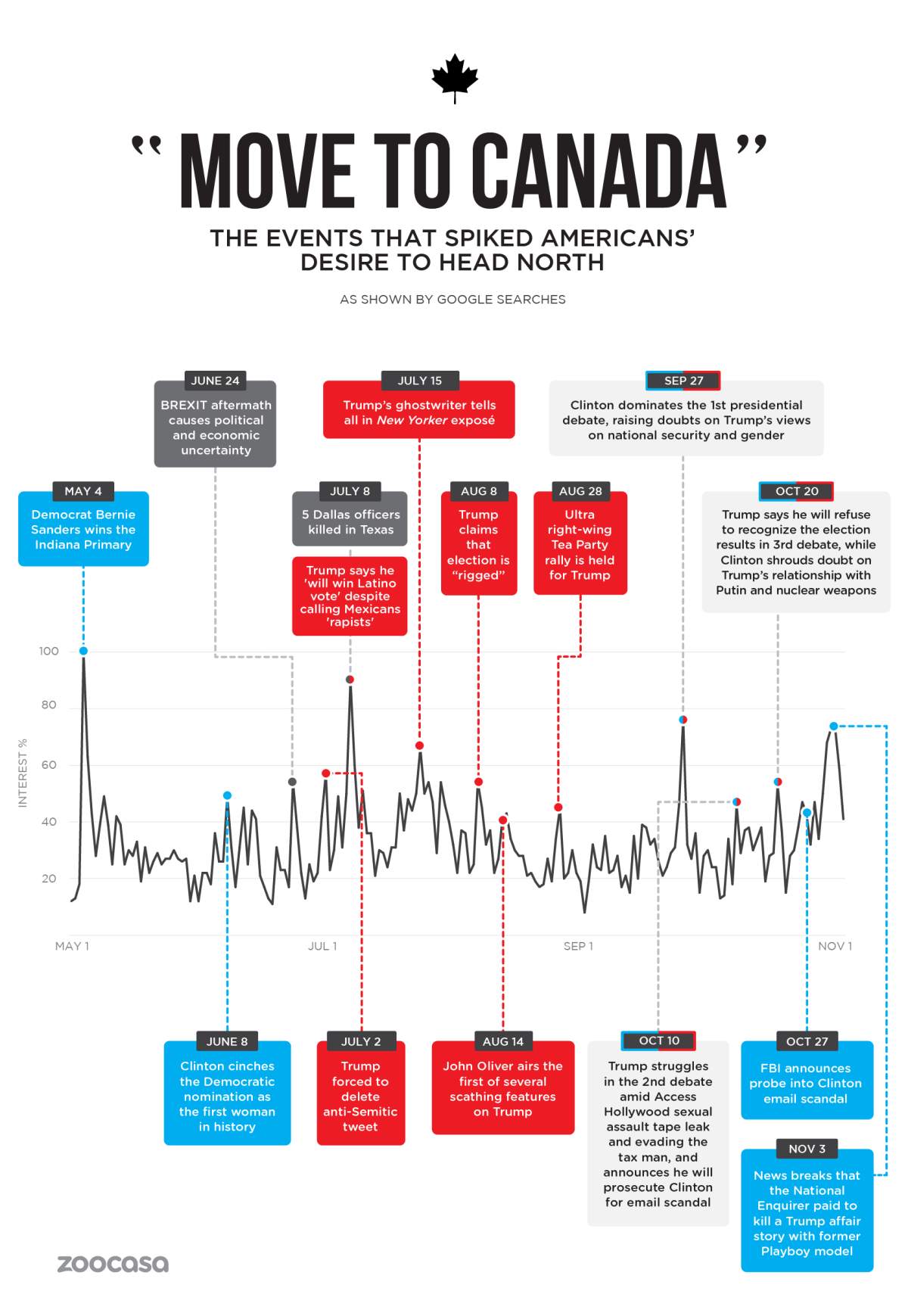We’ve heard the threats. “If Donald Trump (or Hillary Clinton) becomes president, I’m moving to Canada!”

But how serious are Americans about relocating to the Great White North? Very, it seems.
As Trump began to lead in election results, Canada’s Citizenship and Immigration website crashed and searches for one-way tickets to Canada surged 133 per cent on Cheapflights.com (that’s twice as much traffic as there was across the past four Tuesdays).
Some — like 59-year-old Mary McAndrew and her partner of five years, Julie Siri, 67 — have already started the lengthy immigration process, which can take more than six months and cost CAD$6,000.
The couple is ready to trade in the sunny skies of Palm Springs, Ca. for Toronto’s cold, humid winters. McAndrew left the city 16 years ago on a job transfer, thinking California would be her “forever home.”
WATCH: US Presidential Election 2016
When Trump began to rise up the ranks of the Republican Party, though, she and Siri started to seriously consider their options.
“We feel that whether he is elected president or not, the U.S. has forever changed for the worse,” said McAndrew.
“It’s now not just O.K. to openly hate others and make fun of people we don’t understand — it’s actually rewarded and appreciated.”
READ MORE: Hillary Clinton or Donald Trump? Americans head to the polls
Though they haven’t personally experienced any discrimination “yet,” McAndrew admits they didn’t attend a vigil for the victims of the Orlando shooting because they worried there might be violence against members of the gay community.
She says fear has consumed the country.
This past August, McAndrew brought Siri to check out Toronto. It was her first time in Canada.
“She loved it. The people, the safety, the resources, people’s attitudes, our sense of humor and our priorities to live life fully. We’re refreshing to her.”
The two are about to put their California home on the market and look for a condo in Toronto, where they hope to live by the summer.
Who wants to move to Canada and who has a chance?

Get breaking National news
McAndrew is fortunate enough to have a Canadian citizenship, with which she can sponsor Siri. Friends of theirs haven’t been as lucky.
One couple’s immigration request was turned down due to age, McAndrew claims.
Canada’s express-entry program uses point system to judge potential immigrants. Along with age, the system also counts marital status, adaptability, language proficiency, education and work experience.
A score of at least 500 is needed on the 1,200-point qualification system. An age of over 45 gets you zero points. Those in their 20s win the most (100) points in the age category.
Your prospects likely won’t be great if your education level is high school or less (zero points) or if you don’t have a lot of work experience.
Though Canada’s unemployment rate is two percentage points higher than the United States, that hasn’t stopped Americans from looking for jobs north of the border — particularly in Toronto, Alberta and B.C., according to employment search engine Monster.com. The site says it has seen a 50 per cent spike in interest from the states this year from last.
One of the groups best positioned to make the move to Canada: U.S. citizens who get accepted to an accredited Canadian post-secondary institution. They can apply for a student visa and can get a work permit that lets them work up to 20 hours per week during the school year, and full-time during school breaks.
Business owners willing and able to invest will also likely fare well. Eddie Kadri, a Windsor, Ont.-based immigration lawyer, says many have reached out to him.
“There have been some who’ve expressed both [presidential] candidates are not a good option for them. But predominantly you see a lot of anti-Trump sentiment out there from people who have contacted me.”
READ MORE: 4 ways to become a permanent resident or work in Canada
He has more than a dozen American clients, including families, who’ve made the decision to emigrate. At one point, he was getting up to 70 calls from the U.S. a week.
The volume of inquiries has “gone down significantly” since Super Tuesday, when Trump and Clinton took major steps toward claiming their parties’ nominations.
“I think people have already resigned themselves. Either they’re going to stick it out, or they’re already looking to get out.”
But don’t Americans always threaten to leave?
Prime Minister Justin Trudeau didn’t take the surge of American interest too seriously in March.

After all, they’ve made the threats before. Remember in 2015, when gay marriage was legalized across the U.S.? People on Twitter vowed then to move to Canada (where we had legalized gay marriage a decade earlier).
They were more serious after George W. Bush’s 2004 re-election.
READ MORE: Some U.S. liberals walk the walk: immigration to Canada doubled after Bush’s 2004 re-election
Over the next decade, roughly 34,000 Americans fled to Canada compared to the decade prior.
U.S. immigration to Canada rose after the September 11, 2001 attacks, the invasion of Iraq and Bush’s second election victory, but that increase is dwarfed by the thousands of Americans, many in danger of being drafted, who fled to Canada during the Vietnam era.
U.S. immigration to Canada, 1955-2014
America’s Google searches for “move to Canada” were also 1.2 times higher during the 2004 election cycle than in 2016.
Yet Kadri, who says he received a lot of calls then, still thinks Americans are more serious now.
“This case is different, it really is,” he insisted. “I think Donald Trump exposed things that a lot of people knew existed, but didn’t want to ever see it with their own eyes.”
Like McAndrew, he believes this election “is going to change the U.S. forever.”
You can take a closer look at the spikes in “move to Canada” searches below in the timeline from Zoocasa, a Canadian online real estate brokerage.
— With files from Patrick Cain, Tania Kohut and Andrew Russell, Global News
Editor’s note: This post was published on Nov. 8 and updated Nov. 9 with information from election night details.


















Comments